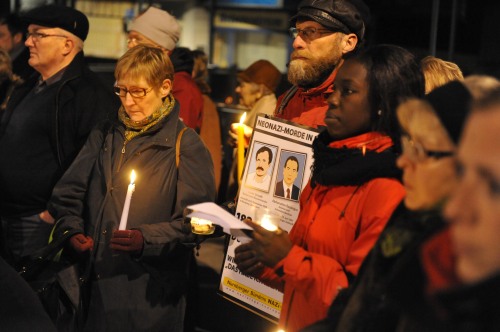Exchange and networking are important for successful local politics.
Current topics and challenges are discussed in networks and experiences, ideas and good practice examples are exchanged.
The City of Nuremberg is also well networked when it comes to integration and intercultural openness. In addition to the Nuremberg Integration Network, the individual divisions and departments are active in various working groups and expert committees at regional, national and international level.
Here are some examples of interdisciplinary networks:
Alliance against Right-Wing Extremism in the Nuremberg Metropolitan Region
In the wake of an increase in right-wing extremist activities in the region, the ‘Alliance against Right-Wing Extremism in the Metropolitan Region’ was founded in 2009 on the initiative of the Human Rights Office of the City of Nuremberg and the ‘Citizens’ Movement for Human Dignity in Middle Franconia, Ansbach City and District’.
The aim was and is to counteract this development.
Integration and Migration Issues Working Group (AKIM)
The ‘Integration and Migration Issues Working Group’ (AKIM) is an open information and exchange body for full-time employees who work in Nuremberg organisations on the topics of integration and intercultural openness.
It includes relevant local associations, welfare organisations, chambers, municipal departments, particularly from the education, culture, school and social sectors, job centres, the Federal Office for Migration and Refugees and other institutions.
The AKIM meets twice a year.
It is managed by the Office for Culture and Leisure of the City of Nuremberg as part of the coordination of the integration programme.
Working group of women in migrant work (AK FidMa)
Specialist women from the Nuremberg, Fürth and Erlangen region who work with migrant women and their families in various organisations meet every two months.
In addition to an exchange of experience and information, these specialist meetings are also about networking and coordinating work with migrant women. Speakers on current specialist topics are invited to the meetings and conceptual developments in migration social work are also discussed.
Contact the FidMA working group via the Nachbarschaftshaus Gostenhof.
Integrating Cities
Integrating Cities is a partnership between the European network of cities EUROCITIES and the European Commission to promote the implementation of the Common Basic Principles of Integration at local level.
It is based on a series of conferences and a work programme led by EUROCITIES in close cooperation with the European Commission.
In 2015, the City of Nuremberg signed the Integrating Cities Charter, according to which 35 cities have now committed themselves to promoting the integration of people with a migration background and advancing intercultural openness by shaping policy and society.
Every three years, the implementation of the charter in the cities is documented in a report.
Municipal Quality Circle on Integration Policy
The nationwide working group is an association of 35 local authorities, supra-regional bodies and representatives from federal authorities, foundations and research.
The Quality Circle has been coordinated by the state capital Stuttgart since 2009.
Objectives of the Municipal Quality Circle:
- The further development of successful examples of integration work and their nationwide accessibility for all interested municipalities.
- The establishment of monitoring systems that make the success of integration work measurable and comparable.
- The development and formulation of recommendations for municipal integration work.

